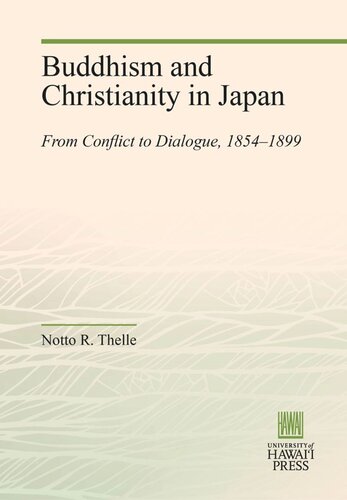

Most ebook files are in PDF format, so you can easily read them using various software such as Foxit Reader or directly on the Google Chrome browser.
Some ebook files are released by publishers in other formats such as .awz, .mobi, .epub, .fb2, etc. You may need to install specific software to read these formats on mobile/PC, such as Calibre.
Please read the tutorial at this link: https://ebookbell.com/faq
We offer FREE conversion to the popular formats you request; however, this may take some time. Therefore, right after payment, please email us, and we will try to provide the service as quickly as possible.
For some exceptional file formats or broken links (if any), please refrain from opening any disputes. Instead, email us first, and we will try to assist within a maximum of 6 hours.
EbookBell Team

0.0
0 reviewsThe modern dialogue between Buddhism and Christianity in Japan is reaching new depths and insights and is being recognized today as a challenging and promising point of contact between two cultures. This volume is based on the premise that an understanding of the past is important for meaningful interaction in the present. By placing the Buddhist-Christian dialogue in historical perspective, the author provides an essential element for critical and creative reflection on today's dialogue.
Thelle's historical examination begins with the arrival of Francis Xavier in 1549, which initiated the "Christian century." However, his main emphasis is on the nineteenth century, when relations between the two religions moved from confrontation to conciliation. The opening of Japan in 1854 initiated a confrontation that was more than a religious conflict; the meeting of the two faiths was part of an all-inclusive cultural clash.
The confrontation of Buddhism and Christianity is interpreted in a broad cultural and sociopolitical context and reveals how strongly both religions were influenced by the social and ideological upheavals in nineteenth-century Japan. The vital issue was which religion would become the spiritual basis for the "new" Japan. Christianity, introduced as the spiritual backbone of Western power, was associated with ideas of modernization and democracy. Buddhism, regarded as part of the old culture, was in serious crisis.
But the conflict was not resolved in victory and defeat. Radical changes took place within the two religions, and by the turn of the century confrontation had moved toward conciliation. The author examines the origins of emerging peaceful dialogue and uncovers the complex process by which it grew out of an atmosphere of animosity and distrust.
Thelle's central themes are the connection between Christian expansion and Buddhist anti-Christian campaigns, religion and nationalism, Christian impact on Buddhist reform movements, attempts at unifying the two faiths into a new religiosity, and the development of an indigenous Japanese theology. He throws light on cross-cultural interactions far beyond the specialized area of religion and theology. With its broad cultural and sociopolitical scope, this book will interest all students of Japanese history and culture.